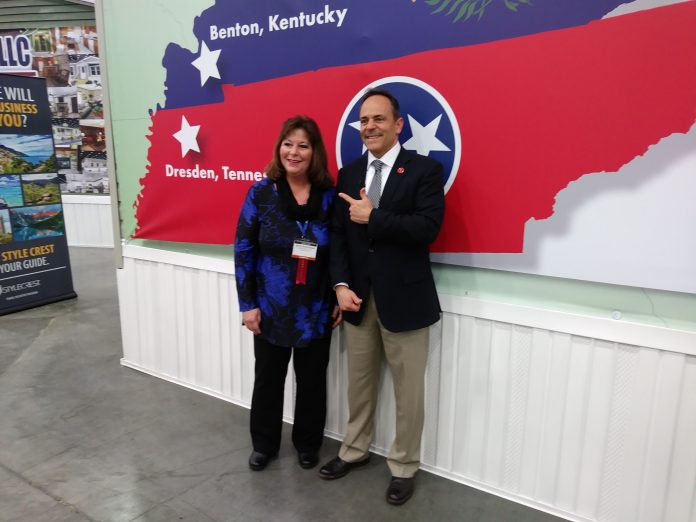
Gov. Bevin Visits Kentucky Expo Center for Record Setting Louisville Show
Kentucky Gov. Matt Bevin has a vision for his state. A generation or two from now, when people think of the center of engineering and manufacturing excellence in the United States, he wants them to think of Kentucky.
He shared his vision during the Louisville Manufactured Housing Show, the Midwest’s premier industry event. Bevin gave a brief speech before touring a few model homes on the showroom floor. He made clear that his vision, if it becomes reality, will impact the manufactured housing industry in multiple ways.
Kentucky Governor Tours New Manufactured Homes in Louisville

The manufactured housing industry already is experiencing several years of growth. That trend may continue, if the record-setting year at The Louisville Show is any indication.
In Gov. Bevin’s remarks, he indicated that Kentucky is in position to take a leadership role in manufacturing and advanced engineering.
When asked to think of the country that exemplifies engineering and manufacturing excellence in Europe, people around the world invariably answer “Germany”, Bevin said. But when asked to think of the state that exemplifies engineering and manufacturing excellence in the United States, people give several answers. There’s no frontrunner.
“Nobody owns it the way Germany owns it,” he said. “And if nobody owns it, what does that mean? That means it’s available for ownership. I want (Kentucky) to own it. We’re well on our way.”
Gov. Bevin Wants to Cut Kentucky’s ‘Red Tape’
For Bevin, a businessman before he was a governor, the first step is attracting manufacturers. To attract manufacturers, the state has been boosting its workforce development, streamlining its tax structure and cutting red tape.
Cutting red tape — simplifying rules and regulations — not only makes it easier for companies to sell their products in Kentucky, it makes it easier for them to produce them there. Bevin referenced a manufactured-home plant that Champion built in Benton, Ky., in 2016, a plant that he’s visited in the past.
“Your product is as fine a product as exists in the marketplace,” Bevin told his audience of manufactured housing professionals. “Last year 2,600 prefabricated homes were brought into Kentucky. We’d like to see more. What will drive that is demand, and demand comes from an environment where people want to live.”
Kentucky Can Leverage Natural Resources, Infrastructure
He listed some of Kentucky’s advantages over its neighboring states. It produces more automobiles than any other state on a per-capita basis. It trails only Washington state in aerospace and aviation production. It’s already a leader in pharmaceutical and medical-device production. It has lots of arable land, excellent weather, more miles of navigable waterways than most states, and plenty of roads, railways and shipping hubs.
Despite these advantages, neighboring states like Tennessee and Indiana have outgrown Kentucky in terms of population.
“We have more natural advantages than they do, but they have more than 2 million more people,” he said. “What’s the difference? It’s tax policy. It’s business policy. It’s getting your financial house in order.
“Imagine 2 million more people. It would transform our entire housing industry. We have room for them, and the ability for them to have quality of life.”
A Closer Look at Affordable Housing
The cost of affordable housing in Kentucky is 30% lower than the national average, Bevin said.
“This is a part of the country that benefits well from prefabricated homes,” he said. “These homes are widely used, but could be so much more so.”
Bevin likened the job of putting Kentucky on a firmer financial foundation to cleaning a barn after a long, hard winter. He has to shovel out a lot of the crap that’s piled up.
“It’s not fun, it’s not easy, but that’s alright,” he told his audience. “You can help us by telling us what we need to shovel out. What’s under the feet of your industry?”
Workforce Development for Manufactured Housing
MHInsider asked Bevin how Kentucky’s workforce development programs can help the manufactured housing industry.
Bevin listed skilled-trades training and apprenticeship programs in high school and work-ready scholarships for all ages. Many of those are paid for, at least in part, by $100 million the state has offered in workforce development and training programs.
He said there are five broad employment areas in Kentucky with the greatest number of open jobs. Those five areas — health care, information technology, logistics, advanced manufacturing, and construction — encompass 60 disciplines, including construction trades such as carpentry.
Strategic Partnerships Key to Workforce Development
About two years ago, the state government offered $100 million in workforce development for those industries. They had to compete for them, however. In order to compete, they were required to include the local business community, local high school and local post-secondary school (including four-year universities, technical and trade schools) in their requests for funding, Bevin said.
Requests for funding reached $540 million, he said.
“We got to select the top 18% or so,” Bevin said, but “we wouldn’t fund all of any idea, no matter how good. We want local skin in the game, from the business community and local government. People who have a vested interest in something get better results.”
The state’s $100 million was matched by $150 million of local and private money.
“These are just seeds going in the ground right now,” Bevin said. “We’re at the very front end of starting to see anything out of that pipeline, but it’s coming.”
He said the state will continue to invest in workforce development programs.
Veterans an ‘Untapped Marketplace’
Bevin mentioned another “untapped marketplace” of employees for industries like manufactured housing: Kentucky’s two major military installations. Every year, 6,000 people leave the military out of Fort Campbell and Fort Knox. Many of these highly skilled, highly disciplined people will go back to their home states, but many might be tempted to stay in Kentucky.
“How can we connect these folks to your industry?” Bevin asked the audience.









